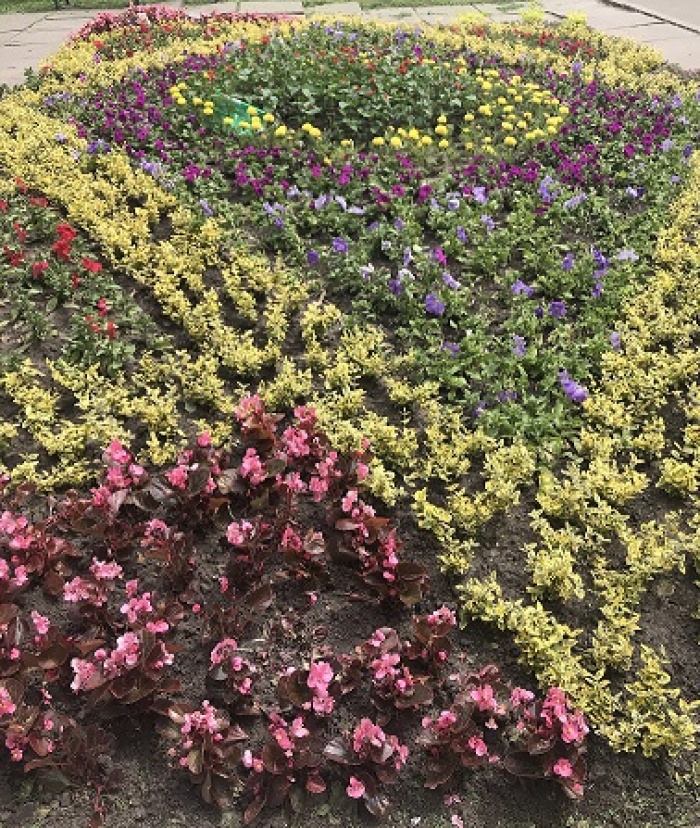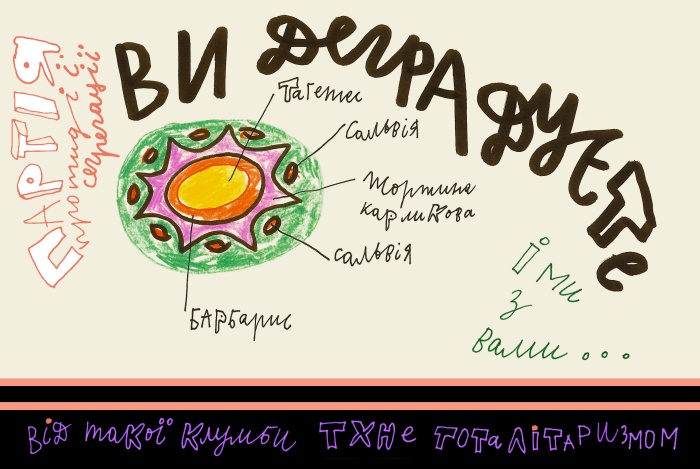In her artistic practice, Alevtina Kakhidze often refers to the world of plants both as a subject matter and as a source material of her work, metaphorically reflecting upon the complex problems of our political reality. In her visual essay, the artist offers a utopia in which a person builds up his/her social order, way of life and relations on the example of how the plants function and behave. Kakhidze gives the plants subjectivity and suggests replacing human optics with a plant’s. The artist questions the anthropocentric view on the world of nature. By drawing a line between the Self and the World of Nature, a human being is alleged to be something over-nature.
Alluding to the political structure of parties, on the example of plants and the culture of their cultivation and consumption, Alevtina Kakhidze is speaking out about human rights, war, and tolerance. The artist criticizes segregation, militaristic and paramilitary groups, systematic violence, media and political mechanisms, calling for the regeneration of resources as an opportunity to acquire rights and to achieve mutual understanding.
I cannot recall when exactly I first realized that human-plant relations are pervaded by ambiguity. Perhaps, it happened when I was still at school, where as homework I was made to write essays entitled “How I love nature”. I found that incomprehensible. Was making declarations of love to nature – plants included – as good as saying that I did not consider myself a part of it? Was nature something distinct and separate from us – or not?
Ever since that moment that I cannot pin down exactly, I have been making sketches about the relationship between people and plants, and about that uncertainty and vagueness – and this about all plants! After all, I have no feelings for any specific plant.
From the human point of view, plants should make more demands on us people. This is why there should be a Demand Party. Such a party could, for example, demand a rehabilitation program for native plants (some of whom suffer because of the “colonizng plants” that have been brought in from elsewhere), or demand that their images must not be used for political or ideological purposes. Some plants have been criminalized.

Sprowadziliście nas, byśmy dekorowały wasze brytyjskie ogrody. Rdestowiec japoński żąda dekryminalizacji. Flamaster, kredki, pisak akrylowy na papierze, obróbka cyfrowa. Dzięki uprzejmości artystki.

Stowrzyszenie roślin pokojowych żąda prawa do opieki albo powrotu do domu! Flamaster, kredki, pisak akrylowy na papierze, obróbka cyfrowa. Dzięki uprzejmości artystki.

Prawo do ochorny dobrego imienia w Ukrainie. Gryka domaga się, by nie wykorzystywać jej w polityce. Flamaster, kredki, pisak akrylowy na papierze, obróbka cyfrowa. Dzięki uprzejmości artystki.

Prawo do ochrony wizerunku. Goździk żąda, by nie używano go w ideologii. Flamaster, kredki, pisak akrylowy na papierze, obróbka cyfrowa. Dzięki uprzejmości artystki.

Partia "Żądania". Flamaster, kredki, pisak akrylowy na papierze, obróbka cyfrowa. Dzięki uprzejmości artystki.
We have done a lot of harm to plants, but if we admit it, as we have admitted to the violent harm caused by colonialism in human history, there still remains a chance that everything can be resolved amicably in the end. That is why there should be a Party of Negotiations. People did not ask potatoes, tomatoes or artichokes for their opinion when they made them migrants. Neither did they ask the opinion of the forests, meadows, and mountains when they ran tunnels and roads across and through them.

Jesteśmy agresywne, co nie jesteśmy w domu. Tak zwany chwast, Amarantus. Flamaster, kredki, pisak akrylowy na papierze, obróbka cyfrowa. Dzięki uprzejmości artystki.

Partia “Porozumienia”. Nikt nie pytał, czy chcemy zostać emigrantami. Ziemniaki, pomidory, karczochy z Ameryk i Afryki. Ogórek, cebula, bazylia z Azji. Flamaster, kredki, pisak akrylowy na papierze, obróbka cyfrowa. Dzięki uprzejmości artystki.
When I walk past the flowerbed in Sich Riflemen’s Street in Kyiv, I can hear the imaginary voice of the Party Against Segregation. The division into cultivated plants and weeds is no longer surprising – such flowerbeds reek of totalitarianism. Here you have a photograph of that flowerbed, and not as an example of something idyllic.

Segregation means the activity of a physical or legal person that for reasons that are not objectively justified separated a person from others on the basis of their specific characteristics. This definition can also be applied to plants, or the color of their blooms. Incidentally, there are no flowers as such, there are simply plants that bloom. By creating such flower beds, people degrade both themselves and the plants.

Partia Przeciwdziałania Segregacji. Nikczemniejecie, a my wraz z wami. Taki klomb śmierdzi totalitaryzmem. Aksamitka, Szałwia, Dalia Karłowa, Szałwia, Berberys. Flamaster, kredki, pisak akrylowy na papierze, obróbka cyfrowa. Dzięki uprzejmości artystki.
I genuinely admire the fact that plants have succeeded in becoming a real Anti-Military Movement. They don’t kill one another straight away – they have a stable position – they cannot run away!

Stabilna pozycja. Flamaster, kredki, pisak akrylowy na papierze, obróbka cyfrowa. Dzięki uprzejmości artystki.

Prawdziwy Ruch Antymilitarystyczny. Flamaster, kredki, pisak akrylowy na papierze, obróbka cyfrowa. Dzięki uprzejmości artystki.

Nie zabijamy się naraz. Flamaster, kredki, pisak akrylowy na papierze, obróbka cyfrowa. Dzięki uprzejmości artystki.
I can also imagine the Fractal party of the Rational Sacrifice. They, the plants, are prepared to partly die for us humans. By cutting their end bits, we do not deprive them of their heads, necks and stomachs, but rather – looking at it from the human perspective – we remove just their hair or nails.

Partia Racjonalnej Ofiary “Fraktale”. Jesteśmy gotowe częściowo umrzeć dla was. Flamaster, kredki, pisak akrylowy na papierze, obróbka cyfrowa. Dzięki uprzejmości artystki.

Partia Racjonalnej Ofiary “Fraktale”. Obcinając nasze kończyny nie pozbawiacie nas głów, szyj i żołądków. To tak jak byście obcinali nam paznokcie czy włosy… Flamaster, kredki, pisak akrylowy na papierze, obróbka cyfrowa. Dzięki uprzejmości artystki.
Translated from Polish by Anda MacBride
BIO
Based in Muzychi, Ukraine, 26 kilometers from the city capital of Kyiv, Alevtina Kakhidze is a conceptual artist who works with ideas of consumption, gender, and power. Having grown up in the Donetsk region of Ukraine, known for coal mining, she has experienced Ukraine’s abrupt and chaotic changes from the days of the USSR to the post-Soviet imbalanced environment, including the undeclared war between Russia and Ukraine that it is going on today. Alevtina Kakhidze attended the National Academy of Fine Art and Architecture in Kiev (1999–2004) and the Jan van Eyck Academy in the Netherlands (2004–2005). She has been the United Nations Tolerance Envoy in Ukraine since 2018, the Kazimir Malevich Artist Award winner in 2008, first prizewinner of the Competition for Young Curators and Artists, Kyiv, Center for Contemporary Art at NaUKMA in 2002.
*Cover photo: Alevtina Kakhidze, Solid Position. Felt-tip pen, color pencils, acrylic liners on paper, digitally manipulated. Courtesy of the artist.



